Merkel Last-Ditch Migrant Deal Reopens EU Deep Divisions
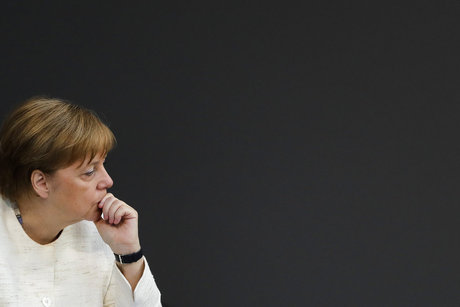
AFP
German Chancellor Angela Merkel came under fire Tuesday from EU partners after she agreed to push back migrants in a last-ditch deal to save her fragile government, a move that also threatened to unleash a domino effect of European nations shutting refugees out.
In high-stakes crisis talks overnight, Merkel put down a rebellion by Interior Minister Horst Seehofer with an agreement to tighten border controls and set up closed "transit centers" to hold migrants on the Austrian frontier.
But the deal, which essentially amounted to an about-turn in Merkel's liberal refugee policy, immediately sparked resistance from Germany's neighbors as well as the third member of her shaky coalition, the Social Democratic Party (SPD).
Austria vowed to "protect its southern borders" while Italy slammed Berlin for adopting the "wrong attitude that brings no solution" and warned that the plan risked running up against last week's hard-fought EU deal that sees the bloc working together to curb migrant arrivals.
Vienna is "of course not ready to conclude deals that harms Austria," said Austria's Chancellor Sebastian Kurz.
"Austria should not have to take on the legacy of a failed welcoming culture that is in Europe linked to some names," charged the country's far-right Interior Minister Herbert Kickl, in an attack against Merkel.
Earlier Vienna's right-wing government had warned that if Germany pushes ahead with its plans, "we will be obliged to take measures to avoid disadvantages for Austria and its people."
And it would be "ready to take measures to protect our southern borders in particular," it said referring to the frontiers with Italy and Slovenia.
Foreign Minister Karin Kneissl also expressed anger that Vienna "was not consulted", in remarks quoted by Austrian media.
- 'Erroneous attitude' -
Vienna's reaction raised the spectre of a domino effect in Europe, with member states taking increasingly restrictive measures to shut out refugees.
Czech Prime Minister Andrej Babis, whose country has flatly refused to take in migrants under a controversial EU quota, leaped on the chance to urge Europe to close its borders.
"Germany has made it very clear that people who disembark in Italy or Greece do not have the right to choose to live in Germany. Hopefully Italy and Greece will understand and close their borders," he wrote in a tweet.
Italy's Prime Minister Giuseppe Conte took aim at Merkel for seeking to tackle movements of migrants within the bloc, rather than stopping them from arriving in the EU in the first place.
"If we concentrate on the resolution of secondary movement, it's an erroneous attitude that brings no solution," warned Conte.
- 'Internment camps' -
Under the pact both sides hailed as a victory, Merkel and Seehofer agreed to hold migrants in "transit centers" on the Austrian frontier to allow the speedy processing of asylum seekers and the repatriation of those rejected.
They would either be sent back to EU countries that previously registered them or, in case arrival countries reject this, be sent back to Austria, pending a now questionable agreement with Vienna.
Seehofer is due to travel Thursday to Vienna, in a bid to push his plan.
CSU general secretary Markus Blume called the hardening policy proposal the last building block "in a turn-around on asylum policy" after a mass influx brought over one million migrants and refugees.
The number of new arrivals has fallen dramatically over the last several months. The accord covers about one-quarter of them, with 18,000 already-registered people crossing the Germany border between January and May this year.
But doubts were voiced quickly by other parties and groups, accusing Merkel of turning her back on the welcoming stance she showed toward asylum seekers at the height of the influx in 2015.
Refugee support group Pro Asyl slammed what it labeled "detention centers in no-man's land" and charged that German power politics were being played out "on the backs of those in need of protection."
Annalena Baerbock of the opposition Greens party spoke of "internment camps", accusing the conservatives of "bidding goodbye to our country's moral compass."
Crucially, it remains uncertain if Merkel's coalition partner, the SPD, will rubberstamp the deal.
SPD leader Andrea Nahles said the party still had "significant questions" on the deal. The Social Democrats are holding joint party meeting with the CDU/CSU bloc.
Ahead of the talks, SPD deputy chairman Ralf Stegner voiced opposition to the transit centers, writing on Twitter: "We don't want any refugee families behind guarded fences."
One of the SPD's migration experts, Aziz Bozkurt, was withering, charging that the proposed holding centers would be "impractical and fully on track with the AfD" -- the far-right party that has been most outspoken against immigrants.
Latest News
-
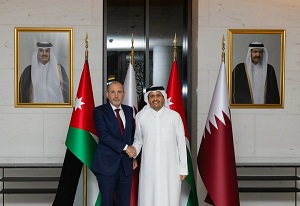 Foreign Minister, Qatari prime minister discuss bilateral ties, Gaza developments
Foreign Minister, Qatari prime minister discuss bilateral ties, Gaza developments
-
 Jordan beats Egypt to reach 9 points at top of group C in Arab Cup
Jordan beats Egypt to reach 9 points at top of group C in Arab Cup
-
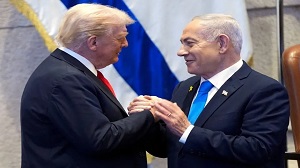 Netanyahu to Meet Trump on December 29
Netanyahu to Meet Trump on December 29
-
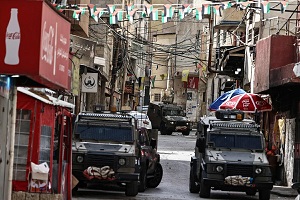 Hamas says no Gaza truce second phase while Israel 'continues violations'
Hamas says no Gaza truce second phase while Israel 'continues violations'
-
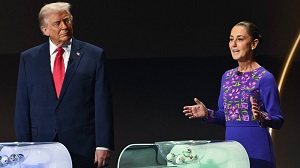 Trump threatens Mexico with fresh tariffs over water dispute
Trump threatens Mexico with fresh tariffs over water dispute